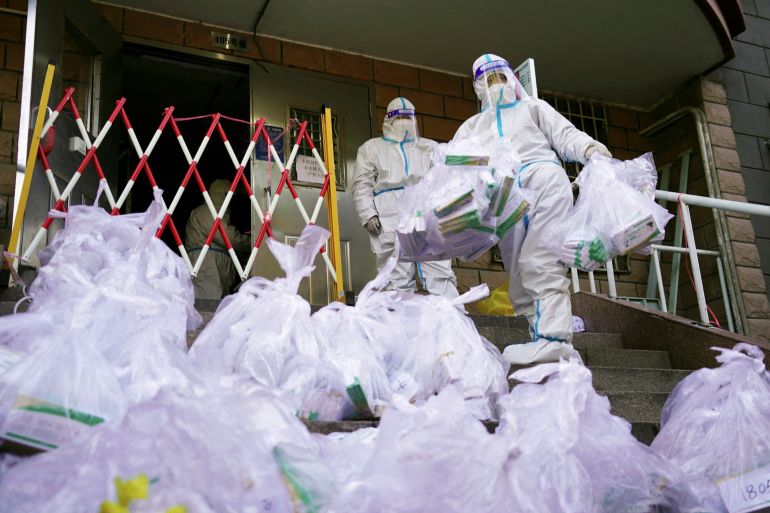Beijing shuts parks, Shanghai tightens entry as COVID cases spike
China’s capital closes more public venues, and Shanghai to impose strict entry rules from Thursday.

Parks and museums have been closed in Beijing while Shanghai has tightened rules for people entering China’s financial hub as authorities grapple with a spike in COVID-19 cases and growing concerns about the economy.
China reported 28,127 new domestically transmitted cases on Monday, close to its daily peak from April. About half of the total infections are in the southern city of Guangzhou and the southwestern municipality of Chongqing.
Keep reading
list of 4 itemsChina lifts weeks-long lockdown on southwest Chengdu
Xinjiang residents complain of hunger after 40-day COVID lockdown
China places millions in lockdown, dealing new blow to economy
Cases in the capital, Beijing, have also been hitting new highs every day, which prompted the city’s government to ask residents to stay put and show proof of a negative COVID test, not more than 48 hours old, to get into public buildings.
On Tuesday, Shanghai ordered the closure of cultural and entertainment venues in seven of its 16 districts after reporting 48 new local infections while the city of Tianjin near Beijing became the latest to order citywide testing.
Authorities in Shanghai said on Tuesday that the city will tighten rules for people entering beginning on Thursday to combat the recent rise in COVID-19 infections.
People who have stayed in Shanghai for fewer than five days will not be allowed to enter public places such as restaurants, bars, shopping malls, supermarkets and indoor gyms, according to a statement published by the Shanghai administration.
They can still go to offices and use public transport, the city government said.
‘Zero-COVID’ test
China has recently introduced adjustments to its ‘“zero-COVID” policy, leading authorities to order clampdown measures but avoid blanket lockdowns, which have strangled the economy and frustrated residents nearly three years into the pandemic.
“Some of our friends went bankrupt, and some lost their jobs,” said a 50-year-old Beijing retiree surnamed Zhu.
“We can’t do many activities we intended to do, and it is impossible to travel, so we really hope that the pandemic can end as soon as possible,” she said.
China still remains a global outlier with its strict COVID restrictions, including borders that remain all but shut.
Despite relaxing some measures, including cutting quarantine for international arrivals from seven to five days, Beijing has repeatedly ruled out a fundamental shift away from “zero COVID” even as public frustrations with the policy mount.
President Xi Jinping’s government argues that the strict policy saves lives and is necessary to prevent the healthcare system from becoming overwhelmed, especially for elderly people who have yet to be vaccinated.
Lockdown frustration
Last week, the main campus of Peking University in Beijing was locked down. Students and staff at the university were told they would not be allowed to leave the grounds unless absolutely necessary and classes were moved online at one campus until Friday, according to a notice from the university.
The latest round of lockdowns has already turned frustration into anger with protests in a district of the southern city of Guangzhou last week.
Many social media users drew a comparison with maskless fans at the football World Cup, which began on Sunday in Qatar.
“Tens of thousands in Qatar don’t wear masks, and we are still panicking,” wrote one user on the Weibo platform.